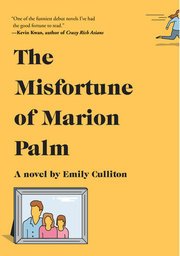The Misfortune of Marion Palm Emily Culliton (2017)
When I tell you that this novel is set in contemporary New York, you may be thinking, “Not another story about bored rich people and their sad affairs!” Well, this one is different.
Marion Palm, the central character in Emily Culliton’s The Misfortune of Marion Palm, is not a New Yorker you’d find in a Jay McInerney novel. She’s a college dropout who’s overweight, not very attractive, and keen on embezzlement. Yes, she lives in a pricey Brooklyn brownstone, but that’s only because she married Nathan, a clueless poet. His trust fund turns out to be smaller than Marion assumed, so Marion embezzles to bring the place up to standard and maintain their lifestyle. She has access to money because she’s a development officer, raising funds at the private school that her two daughters attend. Marion is very good at embezzling, but this school is run so haphazardly that stealing from the till is a piece of cake.
As the book opens, however, an IRS audit of the school is looming. So Marion takes off with a backpack full of cash, leaving Nathan and the young daughters. Marion is not as adept at running away as she is at embezzling, which leads to her involvement with Russian gangsters. Nathan, meanwhile, can barely order pizza delivery and get the girls out the door to the school bus.
Marion’s motivation for fleeing is not only the audit. She has a useless husband and no friends. As we learn in flashbacks, she’s had some raw deals in life. She’s disenchanted with her fake upper-middle-class life and the disdain with which she’s treated by the other parents at the school. She can see how wealthy New Yorkers squander their superfluous dollars, and she views her thefts as helping to correct financial inequality, Robin-Hood style. These issues outweigh Marion’s devotion to her children.
Novelist Culliton’s prose is economical, her dialogue is rapid-fire, and her chapters are brief. Don’t assume that this means that her underlying themes aren’t serious. The plot moves along so speedily that I recommend reading The Misfortune of Marion Palm in one sitting, to get the full effect.
If you like The Misfortune of Marion Palm, you might want to pick up another mold-breaking Brooklyn novel, Lucinda Rosenfeld’s satiric Class, reviewed here. Novelist Maria Semple’s offerings also have a similar feel. Check out my review of Semple’s Today Will Be Different, set in Seattle, here. Like Culliton’s novel, these two also puncture the pretentiousness of the monied set.


